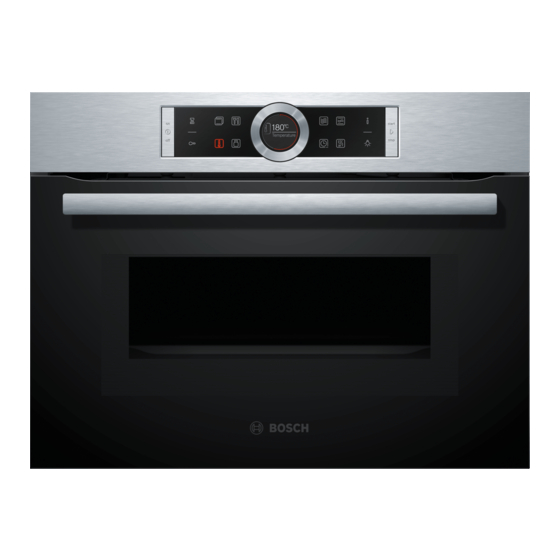Bosch CMG633B.1B 사용 설명서 - 페이지 42
{카테고리_이름} Bosch CMG633B.1B에 대한 사용 설명서을 온라인으로 검색하거나 PDF를 다운로드하세요. Bosch CMG633B.1B 48 페이지. Compact oven with microwave function

Tested for you in our cooking studio
en
Type of heating used:
4D hot air
Dish
Pomes (apple rings, 3 mm thick, 200 g per
wire rack)
Stone fruit (plums)
Root vegetables (carrots), grated, blanched
Sliced mushrooms
Herbs, washed
Preserving
You can preserve fruit and vegetables using your
appliance.
Warning – Risk of injury!
If the food is preserved incorrectly, the preserving jars
may burst. Follow the instructions for preserving.
Jars
Use only clean and undamaged preserving jars. Only
use heat-resistant, clean and undamaged rubber rings.
Check clips and clamps in advance.
For each preserving process, only use preserving jars
that are the same size and contain the same food. In
the cooking compartment, you can preserve the
contents of a maximum of six
preserving jars at the same time. Do not use jars that
are larger or taller than this. The lids could rupture.
Preserving jars must not touch one another in the
cooking compartment during the preserving process.
Preparing fruit and vegetables
Only use fruit and vegetables that are in good condition.
Wash them thoroughly.
Peel, core and chop fruit and vegetables appropriate to
their type and fill the preserving jars with them up to
approx. 2 cm below the rim.
Fruit
Fill the preserving jars with the fruit along with a hot,
skimmed sugar solution (approx. 400 ml for a 1-litre
jar). For one litre of water:
Approx. 250 g sugar for sweet fruit
Approx. 500 g sugar for sour fruit
Vegetables
Fill the jars with the vegetables along with hot, boiled
water.
Wipe the rims of the jars, as they must be clean. Place
a damp rubber ring and a lid on each jar. Seal the jars
Dish
Preserving
Vegetables, e.g. carrots
42
Accessories
Wire rack
Wire rack
Wire rack
Wire rack
1-2 wire racks
, 1 or 1 -litre
Cookware
1-litre preserving jars
Shelf posi-
Type of
tion
heating
2
2
2
2
-
with clamps. Place the jars into the universal pan so
that they do not touch each other. Pour 500 ml hot
water (approx. 80 °C) into the universal pan. Use the
settings indicated in the table.
Ending the preserving process
Fruit
After a short while, small bubbles will form at short
intervals. Switch off the appliance once all preserving
jars are bubbling. Remove the jars from the cooking
compartment after the indicated cooling time.
Vegetables
After a short while, small bubbles will form at short
intervals. As soon as all preserving jars are bubbling,
reduce the temperature to 120 °C and allow the jars to
continue to bubble in the closed cooking compartment
as indicated in the table. After this time has elapsed,
switch off the appliance and make use of the residual
heat for several minutes as indicated in the table.
After preserving, remove the jars from the cooking
compartment and place them onto a clean cloth. Do not
place these hot jars onto a cold or damp surface, as
they may crack. Cover the preserving jars to protect
them from draughts. Only remove the clamps once the
jars are cold.
Recommended setting values
The indicated times in the settings table are average
values for preserving fruit and vegetables. They may be
influenced by room temperature, the number of jars,
quantity, heat and quality of the jar contents. The
specifications are based on 1-litre round jars. Before
you switch off the appliance or change the cooking
mode, check whether the contents of the jars are
bubbling as they should. The bubbling process starts
after approx. 30-60 minutes.
Type of heating used:
4D hot air
Shelf posi-
Type of
Tempera-
tion
heating
ture in °C
1
160-170
120
-
Tempera-
Cooking time
ture in °C
in hours
80
4-7
80
8-10
80
4-7
60
6-8
60
2-6
Cooking time in mins.
Before it starts bubbling: 30-40
When it starts to bubble: 30-40
Residual heat: 30
